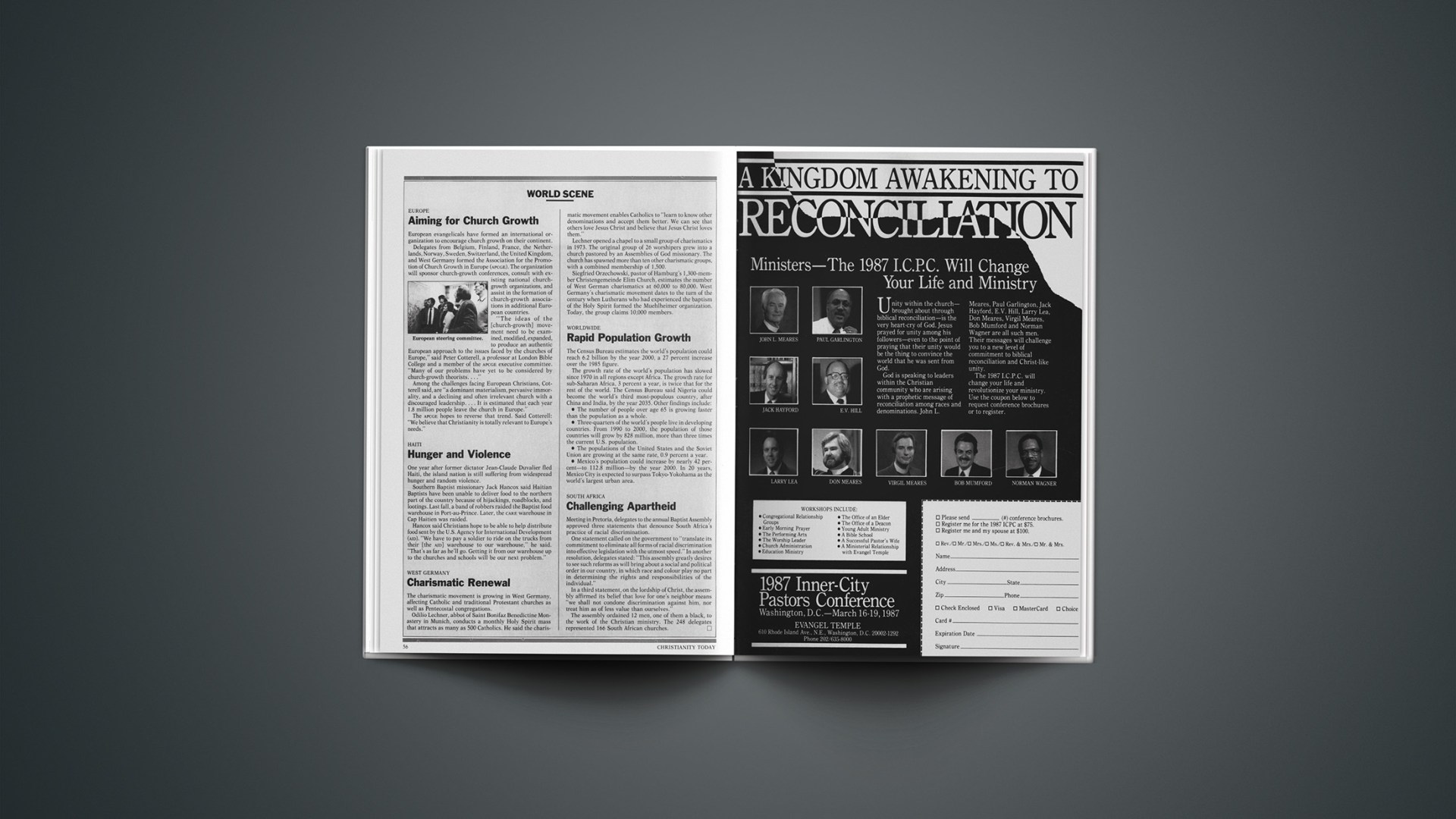EUROPE
Aiming For Church Growth
European evangelicals have formed an international organization to encourage church growth on their continent.
Delegates from Belgium, Finland, France, the Netherlands, Norway, Sweden, Switzerland, the United Kingdom, and West Germany formed the Association for the Promotion of Church Growth in Europe (APCGE). The organization will sponsor church-growth conferences, consult with existing national church-growth organizations, and assist in the formation of church-growth associations in additional European countries.
“The ideas of the [church-growth] movement need to be examined, modified, expanded, to produce an authentic European approach to the issues faced by the churches of Europe,” said Peter Cotterell, a professor at London Bible College and a member of the APCGE executive committee. “Many of our problems have yet to be considered by church-growth theorists.…”
Among the challenges facing European Christians, Cotterell said, are “a dominant materialism, pervasive immorality, and a declining and often irrelevant church with a discouraged leadership.… It is estimated that each year 1.8 million people leave the church in Europe.”
HAITI
Hunger And Violence
One year after former dictator Jean-Claude Duvalier fled Haiti, the island nation is still suffering from widespread hunger and random violence.
Southern Baptist missionary Jack Hancox said Haitian Baptists have been unable to deliver food to the northern part of the country because of hijackings, roadblocks, and lootings. Last fall, a band of robbers raided the Baptist food warehouse in Port-au-Prince. Later, the CARE warehouse in Cap Haitien was raided.
Hancox said Christians hope to be able to help distribute food sent by the U.S. Agency for International Development (AID). “We have to pay a soldier to ride on the trucks from their [the AID] warehouse to our warehouse,” he said. “That’s as far as he’ll go. Getting it from our warehouse up to the churches and schools will be our next problem.”
WEST GERMANY
Charismatic Renewal
The charismatic movement is growing in West Germany, affecting Catholic and traditional Protestant churches as well as Pentecostal congregations.
Odilio Lechner, abbot of Saint Bonifaz Benedictine Monastery in Munich, conducts a monthly Holy Spirit mass that attracts as many as 500 Catholics. He said the charismatic movement enables Catholics to “learn to know other denominations and accept them better. We can see that others love Jesus Christ and believe that Jesus Christ loves them.”
Lechner opened a chapel to a small group of charismatics in 1973. The original group of 26 worshipers grew into a church pastored by an Assemblies of God missionary. The church has spawned more than ten other charismatic groups, with a combined membership of 1,500.
Siegfried Orzechowski, pastor of Hamburg’s 1,300-member Christengemeinde Elim Church, estimates the number of West German charismatics at 60,000 to 80,000. West Germany’s charismatic movement dates to the turn of the century when Lutherans who had experienced the baptism of the Holy Spirit formed the Muehlheimer organization. Today, the group claims 10,000 members.
WORLDWIDE
Rapid Population Growth
The Census Bureau estimates the world’s population could reach 6.2 billion by the year 2000, a 27 percent increase over the 1985 figure.
The growth rate of the world’s population has slowed since 1970 in all regions except Africa. The growth rate for sub-Saharan Africa, 3 percent a year, is twice that for the rest of the world. The Census Bureau said Nigeria could become the world’s third most-populous country, after China and India, by the year 2035. Other findings include:
- The number of people over age 65 is growing faster than the population as a whole.
- Three-quarters of the world’s people live in developing countries. From 1990 to 2000, the population of those countries will grow by 828 million, more than three times the current U.S. population.
- The populations of the United States and the Soviet Union are growing at the same rate, 0.9 percent a year.
- Mexico’s population could increase by nearly 42 percent—to 112.8 million—by the year 2000. In 20 years, Mexico City is expected to surpass Tokyo-Yokohama as the world’s largest urban area.
SOUTH AFRICA
Challenging Apartheid
Meeting in Pretoria, delegates to the annual Baptist Assembly approved three statements that denounce South Africa’s practice of racial discrimination.
One statement called on the government to “translate its commitment to eliminate all forms of racial discrimination into effective legislation with the utmost speed.” In another resolution, delegates stated: “This assembly greatly desires to see such reforms as will bring about a social and political order in our country, in which race and colour play no part in determining the rights and responsibilities of the individual.”
In a third statement, on the lordship of Christ, the assembly affirmed its belief that love for one’s neighbor means “we shall not condone discrimination against him, nor treat him as of less value than ourselves.”
The assembly ordained 12 men, one of them a black, to the work of the Christian ministry. The 248 delegates represented 166 South African churches.










